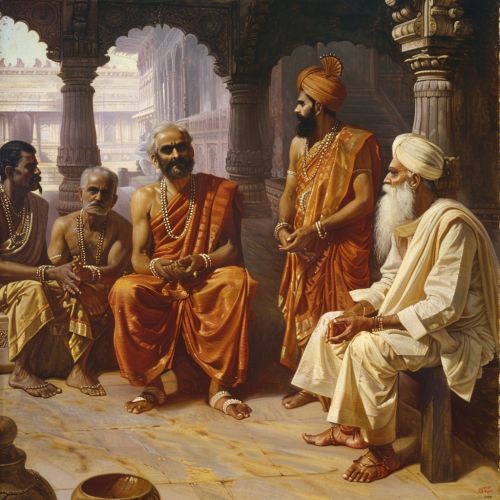Indian philosophy
Overview
Indian philosophy refers to the diverse philosophical traditions that emerged in the Indian subcontinent, including Hindu philosophy, Buddhist philosophy, and Jain philosophy. These traditions share a common heritage of concepts, including dharma, karma, and samsara, among others. Indian philosophy is characterized by a broad spectrum of philosophical concepts and thoughts, with significant emphasis on metaphysical and epistemological theories.
Historical Development
The historical development of Indian philosophy can be broadly divided into three periods: the ancient period, the classical period, and the medieval period. The ancient period, from the 2nd millennium BCE to the 1st century CE, saw the development of the Vedic and Upanishadic philosophies. The classical period, from the 1st century CE to the 10th century CE, was marked by the systematic development of various schools of thought, including Nyāya, Vaiśeṣika, Sāṃkhya, Yoga, Mīmāṃsā, and Vedānta. The medieval period, from the 10th century CE onwards, was characterized by the further development and refinement of these schools of thought.


Schools of Indian Philosophy
Indian philosophy is traditionally divided into two categories: the āstika schools, which accept the authority of the Vedas, and the nāstika schools, which reject the authority of the Vedas. The āstika schools include Nyāya, Vaiśeṣika, Sāṃkhya, Yoga, Mīmāṃsā, and Vedānta. The nāstika schools include Cārvāka, Jain, and Buddhist philosophies.
Āstika Schools
The āstika schools of Indian philosophy are characterized by a belief in the authority of the Vedas and a focus on metaphysical and epistemological theories. These schools developed comprehensive philosophical systems, with detailed theories on topics such as perception, inference, consciousness, self, and reality.
Nāstika Schools
The nāstika schools of Indian philosophy, while rejecting the authority of the Vedas, developed their own unique philosophical systems. These schools are characterized by a focus on practical ethics, skepticism, and materialism, and developed detailed theories on topics such as karma, liberation, and the nature of reality.
Key Concepts
Indian philosophy is characterized by a number of key concepts, including dharma, karma, samsara, moksha, and atman. These concepts form the basis of many philosophical discussions and debates within the various schools of Indian philosophy.
Influence and Legacy
Indian philosophy has had a profound influence on the development of philosophical thought in other parts of the world, particularly in East Asia and the West. The concepts and ideas developed by Indian philosophers have shaped the development of various philosophical traditions, including Buddhism, Jainism, and Hinduism, and have had a significant impact on the development of Western philosophy.
